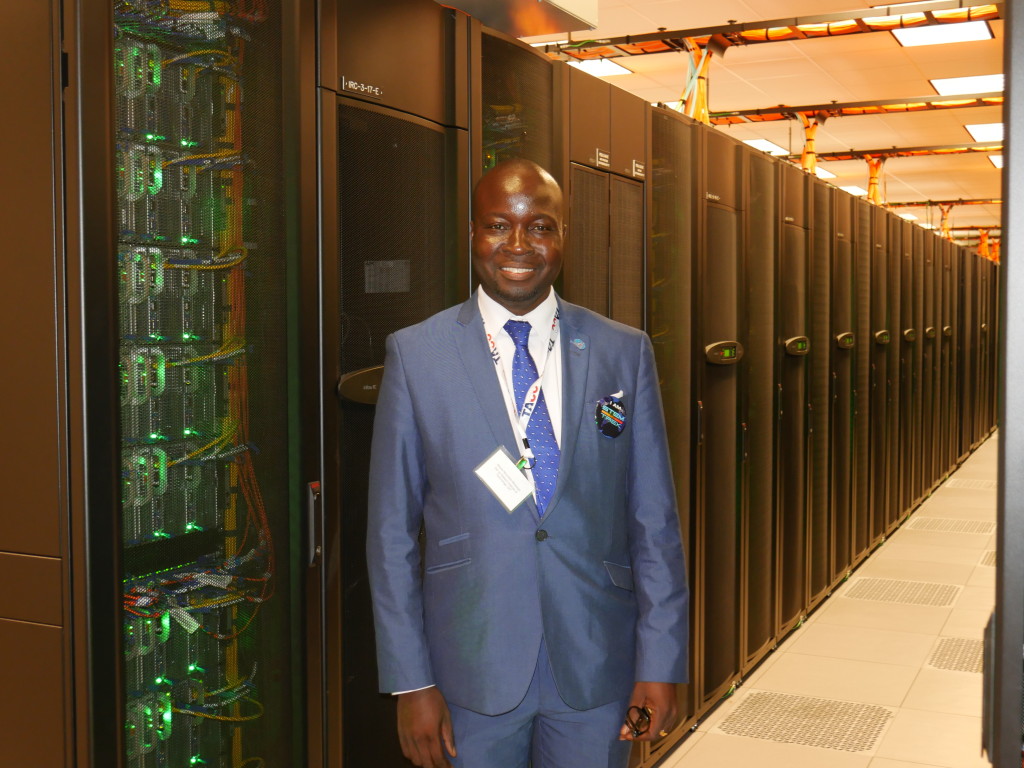 Nkundwe Moses Mwasaga is passionate about high performance computing (HPC), in both micro and quantum capacity.
Nkundwe Moses Mwasaga is passionate about high performance computing (HPC), in both micro and quantum capacity.
“It’s my goal to expose more university students to HPC, and establish benchmarks for computational thinking and technical literacy that could be added to course curricula. I look forward to the TACC workshop and SC15, and to sharing new knowledge with others in Tanzania and the SADC region,” said Mwasaga.
Moses holds a masters degree in engineering (computer intelligent systems and networking), and is pursuing a PhD (with an HPC focus). He began working for the Dar es Salaam Institute of Technology (DIT) in the United Republic of Tanzania in 2004 as a lecturer, founded its masters program of computational science and engineering and designed its HPC in science and engineering module.
His PhD work involves ethno supercomputing (ES), or researching the efficacy of using micro HPC (μHPC) for education and rural outreach. He is fascinated with ES since it’s a new concept that promotes human above technical capacity. He believes the micro/mobile training concept will translate effectively to rural communities around the world, including under-served regions in developed countries. Since large-scale systems aren’t affordable or sustainable in resource-constrained centers, but root skills are critically needed to ensure brighter and more competitive futures for rural citizens, the program has the potential to transform education in rural regions.
 Moses has written three papers with an ES theme, and is working on two more. His first paper addressed lessons learned by DIT when they integrated HPC in their computer engineering degree program. The second paper focuses on μHPC and describes an affordable and portable system that can be transported to rural schools to train students and faculty who lack access to advanced cyberinfrastructure. It could be used to teach HPC system administration, parallel architectures and parallel programming. The third paper is titled “HPC Cluster Systems for Optimization of Learning and Teaching: A Framework for Detecting Pedagogic Improvements in Tanzania.” In this paper, Moses proposed a digital framework for tracking pedagogical improvements in Tanzania.
Moses has written three papers with an ES theme, and is working on two more. His first paper addressed lessons learned by DIT when they integrated HPC in their computer engineering degree program. The second paper focuses on μHPC and describes an affordable and portable system that can be transported to rural schools to train students and faculty who lack access to advanced cyberinfrastructure. It could be used to teach HPC system administration, parallel architectures and parallel programming. The third paper is titled “HPC Cluster Systems for Optimization of Learning and Teaching: A Framework for Detecting Pedagogic Improvements in Tanzania.” In this paper, Moses proposed a digital framework for tracking pedagogical improvements in Tanzania.
The fourth and fifth research papers are works in progress. One is titled “Investigating the Usefulness of micro High Performance Computing Systems as an Educational Tool.” The paper explores the usefulness of μHPC as a computational and training resource. He hopes to answer the question: Does training with μHPC provide students with enough knowledge that they will be prepared to manage large-scale HPC centers in the future? The fifth is titled “A Four-Pillar Sustainability Model (4PSM): Sustainable HPC for Emerging Economies.” This paper explores local policy implications of HPC in emerging economies, and will suggest strategies to effectively influence stakeholder support for research and education cyberinfrastructure and HPC workforce development.




As I was student at Dar es salaam Institute of Technology(D.I.T) between 2010 to 2013,Mr Mwasaga was my Lecturer.He always inject to us anything new concerning Cloud Computing,High Performance Computing the thing which made us more active on studying the concept of H.P.C. Mr Mwasaga convinced the management of D.I.T to add High performance computing in the bachelor of Computer engineering Syllabus and he succeed.I real appreciate him for the current and coming H.P.C and its associated technologies
It is high time for developing countries youth especially from Southern Sahara Countries to indulge into Information Technology research in order to assist rural population on how to get rid of their daily economical and Social challenges.